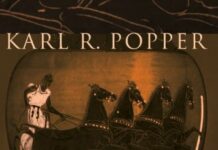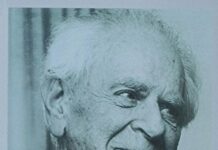
Ebook Info
- Published: 1995
- Number of pages: 256 pages
- Format: PDF
- File Size: 2.16 MB
- Authors: Karl Popper
Description
I want to begin by declaring that I regard scientific knowledge as the most important kind of knowledge we have’, writes Sir Karl Popper in the opening essay of this book, which collects his meditations on the real improvements science has wrought in society, in politics and in the arts in the course of the twentieth century. His subjects range from the beginnings of scientific speculation in classical Greece to the destructive effects of twentieth century totalitarianism, from major figures of the Enlightenment such as Kant and Voltaire to the role of science and self-criticism in the arts. The essays offer striking new insights into the mind of one of the greatest twentieth century philosophers.
User’s Reviews
Editorial Reviews: Review ‘It offers us a chance to renew our acquaintance with this veteran philosopher and to learn some new things.’ – Jim Baggott, New Scientist’Each of these essays speaks out in Popper’s firm, clear, unambiguous voice … they are very readable and persuasive on important issues.’ – Nature From the Back Cover In the course of a life of ninety years Sir Karl can look back on positive changes in the world – the vast reductions in mass poverty, the liberalization of penal systems, the defeat of dictatorships. The search for a better world is never complete, but in spite of two world wars and a long and dangerous cold war, it was not in vain. The essays and lectures collected in this book chart many familiar as well as some less known aspects of Sir Karl’s thinking – from his interest in the birth of scientific speculation in classical Greece to the destructive effects on the intellect of totalitarianism in twentieth-century states. His discussions range over problems of politics, the history of philosophy and great figures of the Enlightenment such as Voltaire and Kant, and the relation of science and art (in an address given at the 1979 Salzburg festival). The book offers important new insights into the thought of one of the greatest of living philosophers, and into the role of science in our civilization. About the Author Karl Popper Read more
Reviews from Amazon users which were colected at the time this book was published on the website:
⭐In this rather optimistic book, Karl Popper explains his own credo, his vision on Kant, the Frankfurt School and Darwinism as well as the `new’ task for the intellectuals.His credo, his task`I am a rationalist. I believe in truth and in human reason. I have in mind the hope that inspired Pestalozzi that knowledge may make us free.’ But, `I have in mind a serious obligation of never to pose as a prophet.’IntellectualsKarl Popper is rightly extremely harsh for those who should be at the forefront of human progress: `Intellectuals have done the most terrible harm for thousands of years. Mass murder in the name of an idea, a doctrine, a theory, a religion – that is all our doing, our invention.’`If only we would stop setting man against man, much would be gained.’IMHO: all these `theories’ are a veil for the interests of those in power, who with any means (war, terrorism, censure, indoctrination, lies, corruption) (try to) defend their power base.KantKant has shown that every man is free, not because he is born free, but because he is born with the burden of responsibility for free decision.Frankfurt SchoolPopper’s verdict is extremely hard: `What have the neo-Dialecticians learnt? The basic thesis of Adorno and Habermas is the claim that factual knowledge and value judgments in sociology are inextricably linked.’ (!)DarwinismPopper had terrible difficulties to accept Darwinism as a scientific theory, because one couldn’t test it. He found a solution which he explained in `Unended Quest’.Here, he develops his vision on Darwinism a little more.The great American biologist G.C. Williams wrote that `natural selection, albeit stupid, is a story of unending arms races, slaughter and suffering. It is a law of nature and its immorality has to be accepted and, at least, to be thought about.’Popper adopts a more Leibnizian view of `a world that has become more and more agreeable and more and more favourable to life, thanks to the activities of life and its search for a better world.’ His view is idyllic: `the first cell is till living after billions of years and transformed out atmosphere with green plants. And it created our eyes and opened them to the blue sky and the stars.’IMHO: This vision is extremely naïve and false. Evolution was only favourable for life of mankind, not for all other species on our planet. His optimistic viewpoint of `active selection for a better environment, active organisms constantly solving problems that improve life’ should be replaced by selection through extermination and mutations by pure chance.Mankind should give more attention to G.C. Williams’s more pessimistic, but all too realistic, interpretation of the way of the world.This book is a must read for all intellectuals and for all critical Popper fans.
⭐I always learn something worth remembering when I read Popper.
⭐The burden of being a philosopher that says something both new and counter-intuitive is that throughout one’s career, you end up repeating yourself, re-clarifying your arguments to the endless number of critcs that misunderstand you. In Popper’s case, the views advanced were that all knowldedge must be held as tentative and that real intellectual progress comes not from verifying true theories (which can never be ‘for sure) but in falsifying and eliminating old ones (which you only need to do once). The critics misinterpreted and Popper did repeat himself time and time again. This is one of the very few bad things about the book. Honestly, if you’ve read Popper before (Conjectures and Refutations, Objective Knowledge, Logic of Scientific Discovery) this book will have little, if any, to add. If you’ve not, this is a great introduction.There are 3 sections: On Knowledge, On History and a section for miscellaneous essays. The first section touches on Popper’s views on how we recieve, criticize, falsify and act on knowledge. The second is an expansion of the first. Here, Popper focuses on historical events hee deems important: Immanuel Kant’s phiosophical formulation, the invention of the book. He also gets a tad bit into politics, where a liberal democracy is preferred.It is the third section, though, that is the payoff. Essays ranging in diversity from “How I See Philosophy” to “What Does The West Believe In”. The best essay in the book, “Toleration and Intellectual Responsibility”, is a critical rationalist’s look at the role of intellectuals (Popper carefully avoids snobbery here) role in perpetuating a tolerant, non-violent society. As crucial now in ’03 as when he gave the lecture in ’82. To conclude, if you are new to Popper, this is a good intro (but Conjectures and Refutations or Popper Selections might still be better. If you’ve read those or much other Popper before, you will probably find yourself able to guess what Popper says in each essay without much problem. You can safely skip this one.
⭐Required reading for every one in this troubled, fake news, rea
⭐ポッパーの主著でも、ペーパー版で4千円前後で買えるのに、1万円近くもするとは、ボッタクリとしか言いようがない。B5版で240頁ほどの洋書だ。
⭐
Keywords
Free Download In Search of a Better World: Lectures and Essays from Thirty Years 1st Edition in PDF format
In Search of a Better World: Lectures and Essays from Thirty Years 1st Edition PDF Free Download
Download In Search of a Better World: Lectures and Essays from Thirty Years 1st Edition 1995 PDF Free
In Search of a Better World: Lectures and Essays from Thirty Years 1st Edition 1995 PDF Free Download
Download In Search of a Better World: Lectures and Essays from Thirty Years 1st Edition PDF
Free Download Ebook In Search of a Better World: Lectures and Essays from Thirty Years 1st Edition




